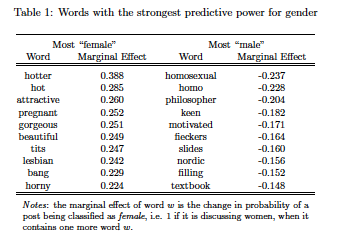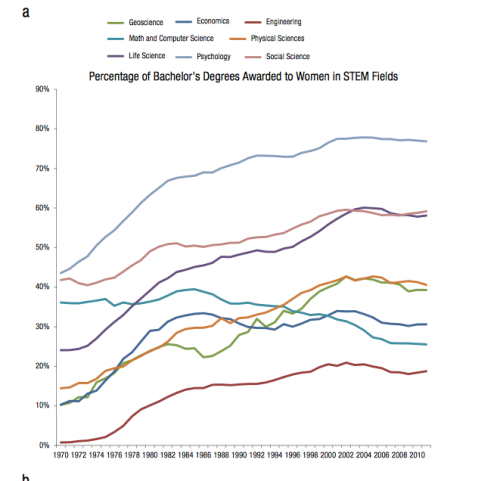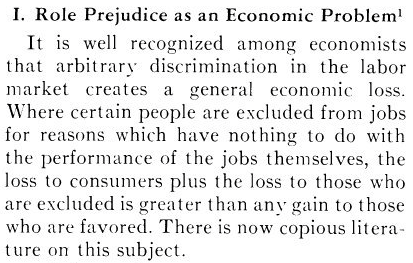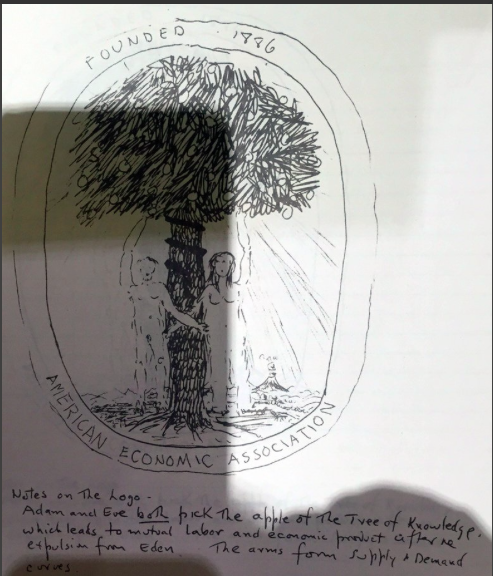A recent paper by Alice Wu, publicized by Justin Wolfers is creating a stir on the econ-twittosphere. The paper uses machine learning assisted text mining and topic modeling to document the astonishing sexism on the Economic Job Market Rumors US student anonymous forum.

In the last 24 hours, the paper has generated several layers of discussions online. Doubts about the representativity of EJMR users have been countered with broader denunciation of sexism within economics, attempts at better characterizing it (from open downgrading and irrelevant remarks about women economists’ bodies to subconscious biases and norms), calls to change this “sexist culture,” and suggestions on how to end the “EJMR cesspool” and how to fight sexism in economics more largely. There has however been less attempts to understand the roots and mechanisms of a sexism that seems comparatively higher than in other disciplines, the reasons why it hasn’t reach the top of economists’ agenda earlier, and its effects on women economists’ career and on the intellectual dynamics of the field. The existence of assholes might be impossible to explain, but why they are more numerous or louder than in most disciplines from physics to psychology (if so), and why they are given a free pass is definitely something to chew on. As for consequences, pervasive sexism has been tied to the low feminization of the profession, which, as has been largely documented, is only matched by computer science and engineering, persisting wage gaps, full professorship glass ceilings and “small pipeline” issues (the problem is not female econ students’ drop off rate but their unwillingness to choose to purse econ undergrad studies in the first place). As for causes, Noah Smith has linked the persistence of EJMR and sexist behavior in the profession to a shift in economists’ political beliefs toward the left (and more gender-friendly attitudes), one that would generate reactions from a fringe of conservative angry men.

One idea I’m toying with (without being convinced yet) is that the mix of sexism, discrimination and gender inequality that econ-twitter is all about now is tied to the tools and models economists use to study inequality and discrimination more generally. Let me be clear. I am not in any way implying that economists’ sexism derive from the use of some kind of “neoclassical” models or that economic modeling begets sexism. I’m simply suggesting that if your job is to study labor discrimination, wage inequality or female labor supply, how you believe these issues play out in your own profession and what should be done to fix it probably shapes, and is shaped by, the models you choose to deploy as an economist. This is what happened when economists initially turned their attention to sexism and discrimination in their community in the 1970s. The mounting protests against the glass ceiling and the pressures and hurdles female economists were experiencing were brought forward by women working on female labor supply and domestic labor. And archival record shows that they explicitly related theoretical and empirical controversies to social fights, as did those male economists who supported them. The “Domestic Labor debate” pitched proponents of Beckerian rational choice explanation for household specialization against the likes of Marianne Ferber, Barbara Bergmann, Francine Blau, Barbara Reagan or Myra Strober who used a whole range of models ranging for neoclassical to feminist and Marxist to emphasize how distorted and segregated the labor market and to promote a historical approach to labor institutions. As recently highlighted by Cleo Chassonery Zaïgouche, then AEA president Kenneth Arrow was forging yet another weapon against Becker’s taste-based model. His theory of statistical discrimination emphasized imperfect information and recruitment costs.
 As I have explained here, the mix of theoretical and social debate resulted in the establishment of the Committee on the Status of Women in the Economic Profession (CSWEP) in 1972. In the CSWEP inaugural report, published in the AEA the following year, Kenneth Boulding introduced gender imbalance in economics as a economic problem in which the AEA was tasked with solving a “betterment production function” : “what are the inputs which produce this output, and particularly, what are those inputs that can be most easily expanded and that have the highest marginal productivity?,” he wrote. And therein might lie the explanation for diverse reactions to gender issues in economics. If you see the small rate female full professor as a result of their choices or productivity, then there is not much to be done. In a more sneaky way, if you don’t endorse Becker’s household economics but routinely write down models in which economic agents’ wages result from their choices and some brand of human capital, you might be gradually drawn to explain the status of your female colleague that way. But if you see an information asymmetry issue (and current debates suggest that EJMR was allowed to thrive and go off rail because of the otherwise privy job market information it provides), then the solution is to build another information structure (another website, new moderating rules, etc). Back in the 1970s, an annual survey on the status of women in economics was established, and an “open market,” the JOE, was set up. So maybe fighting sexism is economics is a market design issue? Or if that’s an expectation issue, try to change women’s expectations. And if that’s a culture issue, then…change the AEA logo ?
As I have explained here, the mix of theoretical and social debate resulted in the establishment of the Committee on the Status of Women in the Economic Profession (CSWEP) in 1972. In the CSWEP inaugural report, published in the AEA the following year, Kenneth Boulding introduced gender imbalance in economics as a economic problem in which the AEA was tasked with solving a “betterment production function” : “what are the inputs which produce this output, and particularly, what are those inputs that can be most easily expanded and that have the highest marginal productivity?,” he wrote. And therein might lie the explanation for diverse reactions to gender issues in economics. If you see the small rate female full professor as a result of their choices or productivity, then there is not much to be done. In a more sneaky way, if you don’t endorse Becker’s household economics but routinely write down models in which economic agents’ wages result from their choices and some brand of human capital, you might be gradually drawn to explain the status of your female colleague that way. But if you see an information asymmetry issue (and current debates suggest that EJMR was allowed to thrive and go off rail because of the otherwise privy job market information it provides), then the solution is to build another information structure (another website, new moderating rules, etc). Back in the 1970s, an annual survey on the status of women in economics was established, and an “open market,” the JOE, was set up. So maybe fighting sexism is economics is a market design issue? Or if that’s an expectation issue, try to change women’s expectations. And if that’s a culture issue, then…change the AEA logo ?

This sketch, unearthed by John Singleton, is Kenneth Boulding’s 1975 proposal for a new AEA logo. Explanation reads: “Adam and Eve both pick the apple of the Tree of Knowledge which leads to mutual labor and economic product after expulsion from eden. The arms form supply and demand curves.”
That the profession is ripe for a serious discussion of Wu’s article and the changes she advocates in her conclusion may reflect not only political shifts but also changes in economists’ approach to inequality, discrimination, norms, and culture. And raising the status of women in the profession might in turn improve the visibility of women economists’ work, and shift the political leaning of the profession, as well as field and method hierarchies further. Enough to scare some.


Wu’s paper can’t ve taken seriously, weak methodoly and overreaching conclusion. It is incredible how people use however weak an evidence is to fit their pre conceptions. Economics is still the only social science that endures some scientific rigour but people are more and more interested in advocate for social causes that will only contribute to undermining the profession.
Funny how people are quick to point out sexism but the majority of econ is male, on an anonym forum, what do you think they will talk about? It is funny that biased words against women are not showing uo (e.g. incompetent, hard worker, undeserving, etc). But because a bunch of men talk often about women in a sexual way that must be sexism. This is what guys talk about, shocking news. Understand that most of the users are young grads. Anyway, this thing is overblown.
“Assume sexism”?
I confess I have only read Justin Wolfers’ piece in the Times, but I had the same reaction as Tom. Take the S words (words that prove “astonishing sexism”). They include words like hot, lesbian, tits, anal, etc. Wu may not know this, but can it really be a secret to Wolfers that young men spend much of their waking hours fantasizing about those things?
In fact, speaking as an older guy, I am not immune to those thoughts myself. When I stop having those thoughts it will be because I am in my grave. Don’t get me wrong, I am not saying it is particularly pretty — it is just a fact of life.
What these words ARE NOT is “hostile” to women.
It is very puzzling to me that while this blog has made many relevant observations about the history of our discipline over the past few years, the only post that gets commented vehemently is this one. First, Béatrice is not claiming that Wu is right, she’s just claiming that Wu’s paper and the reaction to it points to actual issues in the economics profession. And your quick reaction to it – the need to justify the use of words like “tits” our “lesbian” on a forum mostly devoted to a specific job market – is undoubtedly part of the data that proves that there is, indeed, an issue at stake, here. The question that is tackled is not a moral one. It is just to understand how gendered economic knowledge and how it affects the way economists see other aspects of the world. Anyway, speaking of sexism, this is of course not specific to economics, as this article published some time ago had shown: https://www.theatlantic.com/science/archive/2016/07/how-women-are-harassed-out-of-science/492521/
As an older person, you probably refrain from discussing tits and anal around young children and waiters. Save the dirty talk for your lover, and let your colleagues do their thing without wondering if your pauses indicate pornographic indulgences.
1) the topic of my post is not Wu’s paper, it’s how economists reacted to it (in fact, there has been little substantive discussion of the paper so far)
2) on the notion that “economics is still the only social science that endures some scientific rigor,” my suggestion is to read the last issue of the American Journal of Sociology (or Political Science). If you need some historical perspective, here’s where to begin: http://econpapers.repec.org/bookchap/cupcbooks/9780521717762.htm
3) I thoroughly disagree with you interpretation of what happens on EJMR as “men just doing manly things here,” though you will probably find solace in the fact that Tyler Cowen seems to agree with you (http://marginalrevolution.com/marginalrevolution/2017/08/misgivings-tone-emphasis-headed.html). I won’t even discuss whether it’s okay that “men talk often about women is an sexual way.” My point is that because they do so PUBLICLY on EJMR, hiding their identities but not their targets’ identity, the analogy with “locker room talk” is misleading. One is public, the other is not, and doing so in public serves a social/cultural/power purpose.
not sure a website that few have heard of merits ” publicly ” . besides the problem with economics is a quality one . dogmatic distractions wont allow for improvement in this area . unless you believe tapping underused female talent will lead to some kind of miracle . on another point , your twitter account must be getting close to the cliff edge . your twitter history will be lost if this happens . future google searches in relation to your name and subject areas will yield less or nothing . you are probably aware of this . but i just thought i would mention